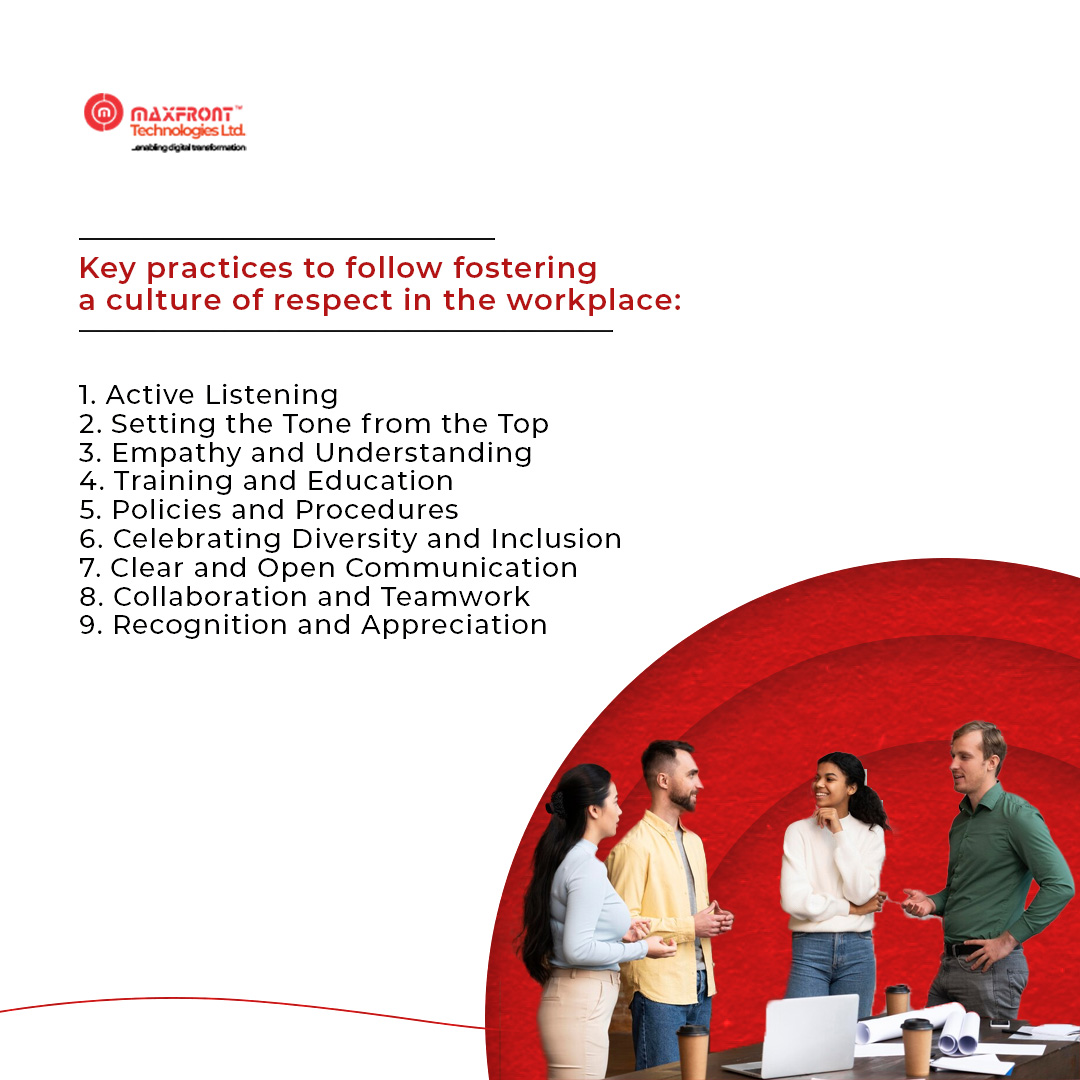
In today’s fast-paced and diverse workplaces, fostering a culture of respect has become more critical than ever. A culture of respect encompasses treating colleagues, regardless of their background or position, with dignity, fairness, and professionalism. Respect is essential for a positive and productive work environment, and in this blog post, we will explore the significance of cultivating such a culture and discuss key practices that can help organizations create a respectful and inclusive work environment.
A culture of respect in the workplace promotes positive interactions, open communication, and mutual appreciation, valuing diversity and encouraging employees to express their thoughts without fear of discrimination.
Here are the key practices to follow to foster a culture of respect in the workplace:

- Active Listening
One of the fundamental ways to show respect to your colleagues is through active listening. When someone is speaking, give them your full attention. Maintain eye contact, nod in acknowledgment, and avoid interrupting. By actively listening, you validate their thoughts and ideas and foster open communication and understanding.
- Setting the Tone from the Top
Leadership plays a pivotal role in shaping workplace culture. By modelling respectful behaviour, leaders inspire employees to follow suit. Communicating clear expectations regarding respectful conduct and addressing deviations promptly sends a powerful message. Encouraging employee feedback and participation cultivates a sense of ownership and inclusivity, fostering respect throughout the organization.
- Empathy and Understanding
Demonstrating empathy and understanding towards your coworkers goes a long way in building respectful relationships. Put yourself in their shoes, try to understand their perspectives, and show compassion. Recognize that everyone has different backgrounds, experiences, and challenges. By showing empathy, you create an inclusive and supportive workplace culture.
- Training and Education
Regular training on respectful workplace practices is crucial for enhancing awareness and understanding. Training programs can address unconscious bias, microaggressions, and the importance of cultural sensitivity. Providing resources for reporting and addressing disrespectful behavior empowers employees and ensures their concerns are taken seriously.
- Policies and Procedures
Clear and comprehensive policies on discrimination and harassment are essential for maintaining a respectful work environment. These policies should be communicated effectively to all employees and consistently enforced. Encouraging open communication and transparency in addressing complaints builds trust and reassures employees that their voices will be heard.
- Celebrating Diversity and Inclusion
Recognizing and valuing diversity is at the heart of respectful workplace culture. Organizations can foster an inclusive environment by embracing different perspectives, backgrounds, and experiences. Encouraging diverse hiring and promotion practices helps build a workforce that reflects the broader community. Creating cross-cultural understanding and collaboration opportunities promotes respect and appreciation for diverse viewpoints.
- Clear and Open Communication
Effective communication is vital for maintaining respect in the workplace. Be transparent, honest, and respectful in your interactions. Clearly communicate expectations, provide constructive feedback, and address conflicts promptly and professionally. Foster an environment where individuals feel comfortable expressing their ideas, concerns, and opinions without fear of judgment or reprisal.
- Collaboration and Teamwork
Respectful workplaces thrive on collaboration and teamwork. Encourage and facilitate collaboration by promoting a sense of shared purpose and inclusivity. Create opportunities for teamwork, encourage cross-departmental partnerships, and foster an environment where diverse perspectives are valued. Working together towards common goals builds a strong foundation of respect within your team.
- Recognition and Appreciation
Expressing appreciation for your colleagues’ efforts and achievements is a powerful way to demonstrate respect. Acknowledge their hard work, accomplishments, and contributions both privately and publicly. A simple thank you, or a word of encouragement can go a long way in fostering a positive and respectful atmosphere.
Benefits for Employees and the Organization
A respectful work environment promotes employee well-being and satisfaction, increases collaboration and teamwork, fosters collaboration and teamwork, improves communication and conflict resolution, boosts diversity and inclusion, enhances organizational reputation, and mitigates the risk of legal and reputational damage associated with disrespectful behaviors or incidents. Organizations that prioritize and foster a culture of respect are viewed positively internally and externally, attract top talent, enhance customer loyalty, and strengthen partnerships with other organizations.
Conclusion
Fostering a culture of respect in the workplace is not only the right thing to do, but it is also essential for nurturing positive relationships, promoting employee well-being, and driving overall organizational success. A culture of respect benefits both employees and the organization. Employees who feel respected are more engaged, motivated, and productive. Respectful workplaces also attract and retain talented individuals from diverse backgrounds, fostering innovation and creativity. Ultimately, a respectful culture contributes to a positive work environment and enhances the organization’s reputation.
Organizations can create an environment where respect thrives by implementing key practices such as setting the tone from the top, providing training and education, establishing clear policies and procedures, celebrating diversity, active listening, empathy, valuing diversity, clear communication, recognition, and collaboration. All stakeholders must prioritize respectful workplace practices and work together to build an inclusive and harmonious work environment for everyone. Remember, small actions and gestures can significantly create a respectful workplace where individuals feel valued, supported, and motivated to give their best.